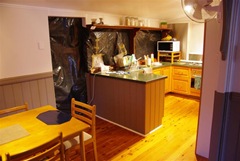 While they were cutting out the floor and building the new staircase we taped up some black plastic tarps to block off the construction zone openings from the rest of the house. When they had to demolish our old concrete bathroom floor the entire house got covered in concrete dust. This time we didn’t want to take any chances, so we put the black plastic sheets up a few days in advance (last time they were a day early, so I didn’t get to put the sheets up).
While they were cutting out the floor and building the new staircase we taped up some black plastic tarps to block off the construction zone openings from the rest of the house. When they had to demolish our old concrete bathroom floor the entire house got covered in concrete dust. This time we didn’t want to take any chances, so we put the black plastic sheets up a few days in advance (last time they were a day early, so I didn’t get to put the sheets up).
Taping up the black plastic worked well and kept most of the dust out. I would recommend it to most people if you need to keep living in the house, and / or if you want to keep the rest of the house clean.
The biggest problem that we had is that the bathroom is on the other side of the black plastic. This made for some rather uncomfortable mornings, and a lot of trips out for lunch so that we could use the bathroom at the mall or the restaurant.
In the evenings we would peal back the tape and plastic a bit so that we could squeeze through for the bathroom. Not ideal, but it worked …